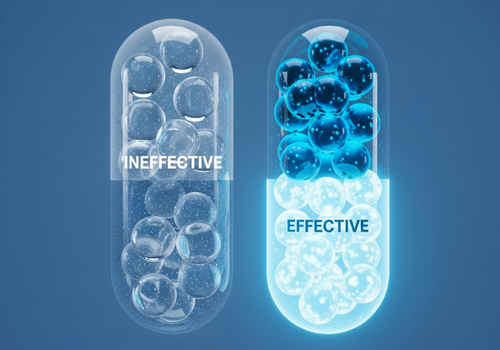Why Popular Supplements on Amazon May Not Deliver Results — And How to Avoid Wasted Money
Hype Doesn’t Equal Results
It’s easy to be swayed by a supplement that has thousands of five-star reviews or is marked as an “Amazon’s Choice,” but these signals are often more about marketing than effectiveness. Many of the most popular supplements are aggressively promoted through ads and influencer marketing, which drives sales but not necessarily quality. High sales volume earns badges like “Best Seller,” even if the formulation is subpar. Just because a supplement is popular doesn’t mean it’s well-formulated or right for your needs. Often, these products are built for mass appeal, using flashy claims rather than clinically backed ingredients.
Underdosed Ingredients and Weak Formulas
One of the most common issues with popular supplements is that they contain underdosed ingredients—just enough of a trendy nutrient to list it on the label, but not enough to actually provide a benefit. For example, a stress-relief supplement might advertise Ashwagandha, but only include 50 mg when studies suggest 300–600 mg of a standardized extract is needed for real results. Manufacturers do this to keep costs low and margins high, especially on mass-market platforms. This leaves consumers buying a “health” product that doesn’t deliver the intended support, leading to wasted time and money.
Lack of Clinical-Grade, Bioavailable Forms
Even when ingredients are present, the form of those ingredients matters. Many popular supplements on Amazon use cheaper, less absorbable versions that offer minimal benefit. Take magnesium, for example—magnesium oxide is common in cheaper products but poorly absorbed by the body, whereas magnesium glycinate or threonate is far more bioavailable. Similarly, B-vitamins are more effective in their methylated forms, but mass-market products often skip these due to higher costs. If a product doesn’t use clinically studied, bioavailable forms of ingredients, it’s unlikely to produce noticeable or meaningful results.
Manipulated Reviews and Artificial Ratings
Product reviews on Amazon can be manipulated through incentivized feedback, review farming, or even fake purchases. A supplement with thousands of positive reviews may have achieved those ratings not through real results but through paid campaigns or review swapping groups. Many users report being offered gift cards in exchange for positive reviews. This makes it hard for genuine buyers to know what to trust. While Amazon has cracked down on these practices, they still persist. Always look for verified purchase reviews and read the detailed comments to spot patterns and inconsistencies.
Overpromising and Under-Delivering Claims
Popular supplements often rely on exaggerated claims to grab attention—promising rapid weight loss, instant energy, or miraculous health transformations. These kinds of statements are rarely backed by real science and can set unrealistic expectations. Supplements should be viewed as long-term health supports, not quick fixes. Brands that make bold, unqualified claims without citing studies or clarifying timelines are usually more focused on making sales than delivering health benefits. Overpromising can also mask the fact that the formulation itself may be weak or irrelevant to the intended goal.
Unknown Brands with No Transparency
A large number of popular Amazon supplements are produced by unknown or generic brands that lack transparency about their sourcing, testing, or manufacturing processes. These brands may pop up quickly, flood the marketplace with cheap products, and then disappear when issues arise. They often have no real website, no customer support, and no accountability. Without third-party testing or published Certificates of Analysis (COAs), there’s no guarantee you’re getting what the label says. Trustworthy brands are open about their practices and will always give consumers access to real quality data.
The Influence of Price Over Quality
Another reason popular supplements fall short is pricing. Amazon consumers often prioritize low cost and fast shipping, which drives brands to cut corners. To remain competitive, many products sacrifice ingredient quality, purity, or dosage strength to maintain a low price point. While affordability is important, extremely cheap supplements are often a red flag. Health products that are too inexpensive to be true may be using fillers, weak actives, or even unverified raw materials. Smart consumers should compare ingredient lists, dosages, and certifications rather than shopping on price alone.
How to Avoid Wasting Money on Ineffective Supplements
To avoid disappointment, consumers must shift from buying what’s popular to buying what works. Start by researching the ingredients and checking their clinical dosage ranges. Choose products with recognizable certifications like NSF, USP, or Informed-Sport, which confirm third-party testing and manufacturing standards. Look at the supplement facts panel, not just the front of the bottle. Seek out brands that provide transparency, detailed ingredient sourcing, and easy-to-find COAs. Don’t rely solely on Amazon listings—visit the brand’s official website and check if the product is also endorsed by healthcare professionals or has been studied.
Conclusion:
Just because a supplement is popular on Amazon doesn’t mean it’s effective or right for you. Many top-selling products rely on aggressive marketing, questionable reviews, and low-quality formulations to attract buyers—leading to wasted money and unmet health goals. By learning how to evaluate ingredients, dosages, bioavailability, brand transparency, and certifications, you can shop smarter and invest in supplements that truly support your well-being. Avoid the trap of hype and focus instead on science, quality, and personal suitability for results that matter.

